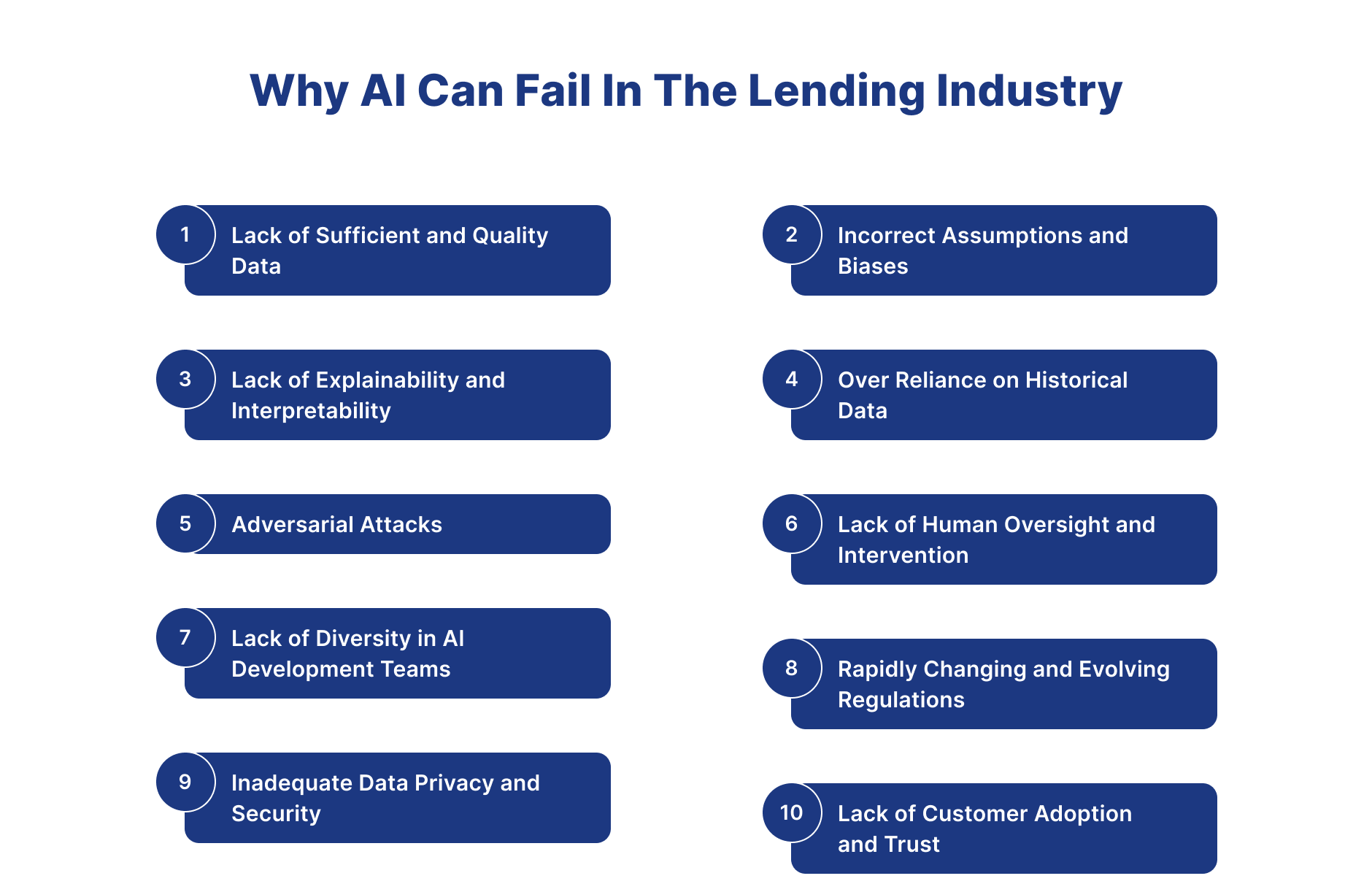10 Reasons Why AI Can Fail In The Lending Industry
Posted by Hitul Mistry
/29 Dec 23
Tagged under: #aicanfail,#aicanfailinlending,#lendingindustry
AI-powered lending systems offer the ability to expedite operations, cut costs, and make better loan decisions. sometimes ai can fail in the lending industry
Introduction

- Artificial intelligence (AI) has transformed many businesses, including lending. AI-powered lending systems offer the ability to expedite operations, cut costs, and make better loan decisions. However, despite its numerous advantages, AI has its challenges. There are various reasons why AI may fail in the loan sector. In this article, we will look at some Reasons Why AI Can Fail in the Lending Industry.
Why AI Can Fail in the Lending Industry

1.Lack of Sufficient and Quality Data
- One of the most significant issues that AI algorithms confront is a need for more sufficient and high-quality data. AI makes forecasts and recommendations about lending based on past data. If the historical data is adequate, old, and biased, the AI model's predictions may be correct, potentially leading to failure. Furthermore, a lack of diversity in the dataset might generate biases, leading to biased lending practices. by this way ai can fail in the lending industry.
2.Incorrect Assumptions and Biases

- AI algorithms make assumptions depending on the data they are trained on. However, the AI model may generate biased findings if the underlying assumptions need to be revised or revised. These prejudices might disproportionately influence particular demographic groups, resulting in loan discrimination. It is critical to guarantee that the AI algorithms employed in the loan business are adequately evaluated for biases and that assumptions are questioned. by this way ai can fail in the lending industry.
3.Lack of Explainability and Interpretability
- Another area for improvement with AI in the loan sector is its need for more explainability and interpretability. Complex algorithms, such as deep learning models, sometimes need more transparency, making it difficult to comprehend how a given conclusion was achieved. This lack of openness can create ethical problems and make it difficult for lenders to justify lending choices to borrowers or regulatory agencies. The inability to grasp the logic behind AI judgments is a hurdle to increasing confidence and adoption of AI in lending. by this way ai can fail in the lending industry.
4.Over Reliance on Historical Data
- While historical data is helpful for training AI systems, relying too much on prior data might be dangerous in some lending settings. For example, previous statistics may need to correctly reflect the current lending situation during economic downturns or financial crises. If the AI model does not adjust to these changing circumstances, it may result in improper lending choices and increasing loan defaults. by this way ai can fail in the lending industry.
5.Adversarial Attacks
- AI models are subject to adversarial assaults, in which malevolent actors purposefully influence or fool the system. In the lending business, fraudsters might use flaws in AI algorithms to get loans under pretenses or alter creditworthiness evaluations. These assaults can cause lenders financial losses and jeopardize AI-based lending systems' integrity. by this way ai can fail in the lending industry.
6.Lack of Human Oversight and Intervention
- Although AI algorithms are frequently viewed as impartial decision-makers, they require human monitoring and interaction. More than relying on AI with human intervention can lead to problems, especially when dealing with complicated or unique loan instances. Human experience is required to guarantee that AI models are deployed effectively, assess outcomes, and make sound lending choices. by this way ai can fail in the lending industry.
7.Lack of Diversity in AI Development Teams
- The importance of diversity in AI development cannot be overstated. If AI development teams lack diversity in terms of gender, color, and background, it might result in biased algorithms. Diverse viewpoints and experiences are required to guarantee that AI models make fair and impartial lending judgments. by this way ai can fail in the lending industry.
8.Rapidly Changing and Evolving Regulations
- Fair lending laws and anti-discrimination legislation control lending practices in the lending business. These restrictions are subject to fast change, and AI models must comply. Failure to keep up with new legislation might result in AI models making non-compliant conclusions, with legal and reputational consequences. by this way ai can fail in the lending industry.
9.Inadequate Data Privacy and Security
- Lending includes sensitive financial information. Therefore, data privacy and security are critical. AI models rely on massive volumes of data, and any mismanagement or illegal access to this data can result in breaches and compromises of client information. Protecting consumer data and providing adequate security measures are critical for preventing failures and maintaining confidence in the banking business. by this way ai can fail in the lending industry.
10.Multi-Layer Authentication
- Customers must adopt and trust AI to be effective in the loan sector. A lack of awareness, skepticism, or fear may hamper customer acceptance of AI. Clear communication about how AI is utilized and its advantages and proving openness and fairness in loan choices may help create consumer trust and drive adoption.
Conclusion
- Customers must adopt and trust AI to be effective in the loan sector. A lack of awareness, skepticism, or fear may hamper customer acceptance of AI. Clear communication about how AI is utilized and its advantages and proving openness and fairness in loan choices may help create consumer trust and drive adoption. by this way ai can fail in the lending industry.
How Digiqt will help you adapt AI in the sales department
-
At Digiqt, we are dedicated to assisting companies in automating critical processes. Our highly skilled and professional team ensures the timely development and delivery of AI software. We commence by thoroughly understanding our client's specific requirements, and based on these requirements, our proficient team develops the AI software. Furthermore, we provide our clients monthly updates on the software development progress.
-
Digiqt's commitment to automation, client-centric software development, and regular updates ensures efficiency and effectiveness in streamlining insurance operations.
Contact Us
About Us
We are a trusted, quality driven and value-driven digital product development company delivering services in BFSI sector.
Digiqt Technolabs is a passion turned into a company. We are a trusted product development company that specializes in turning your ideas into digital solutions utilizing our years of experience in industry-leading technologies.
We deliver high-tech innovations and great solutions for our clients in the most efficient manner regardless of the project complexity.
We are trusted, quality-driven and value-driven product development company.

Our key clients
Companies we are associated with
Our Offices

Ahmedabad
706,31FIVE Building,opp.Palladium, Corporate Rd, Makarba, Ahmedabad, Gujarat.
+91 99747 29554

Mumbai
WeWork, Enam Sambhav C-20, G Block,Bandra- Kurla Complex, MUMBAI-400051, Maharashtra.
+91 99747 29554

Stockholm
Bäverbäcksgränd 10 12462 Bandhagen, Stockholm, Sweden.
+46 72789 9039












